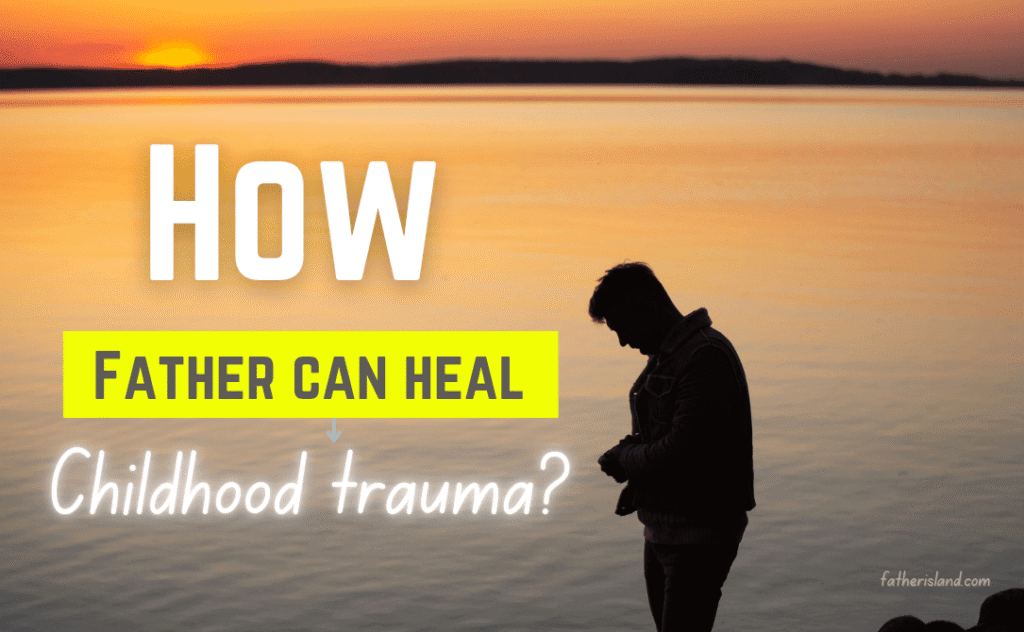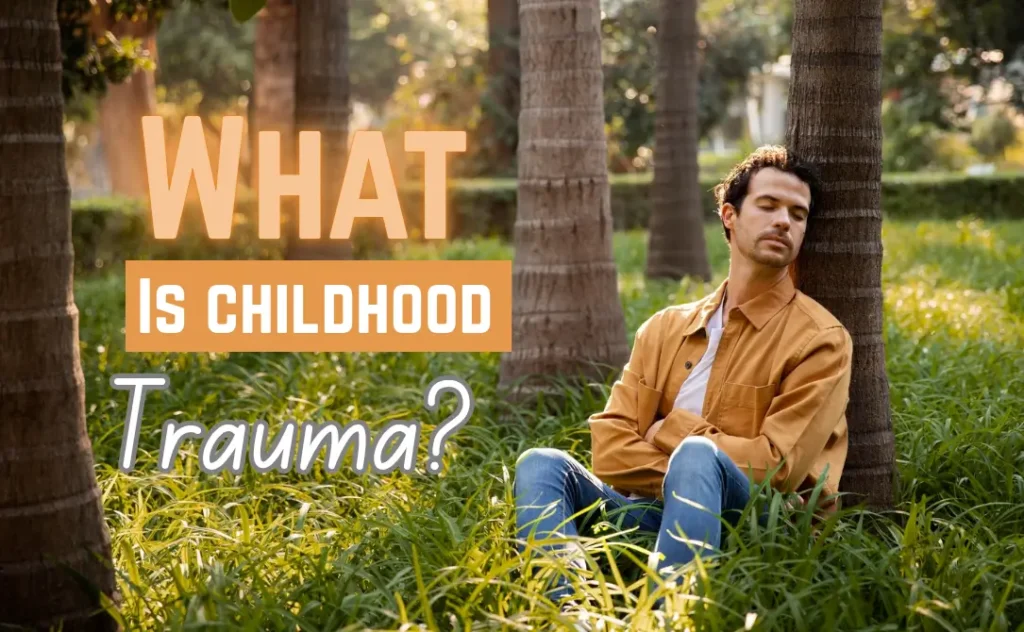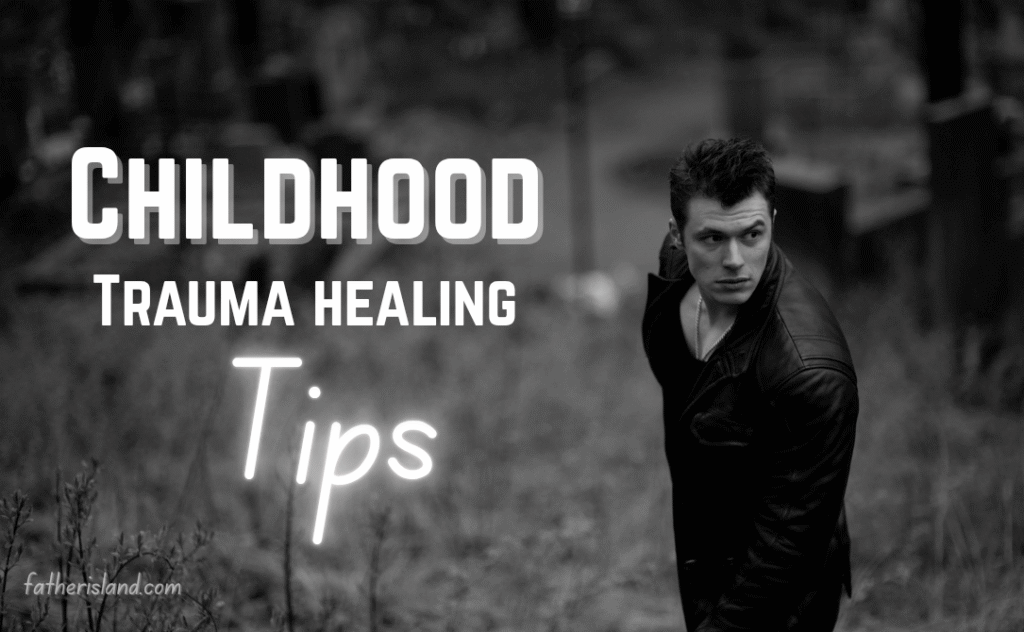
Have you ever felt like you want to connect with your child from the heart, but someone inside is stopping you? If yes, you are not alone.
Many fathers dealing with childhood trauma go through this silent struggle where childhood wounds unconsciously influence today’s parenting.
This is completely normal, and most importantly, it can be changed. Healing childhood trauma as a father is a difficult journey, but not impossible.
If you often get angry, suppress emotions, or have difficulty connecting with your child, then understand that this article is just for you.
Here you will get the exact information and support that you really need so that you can give yourself and your child a better life. Read on, this journey can be the beginning of your healing.
What is Childhood Trauma?

Childhood trauma means facing such incidents in childhood, which deeply hurt the mind and emotions of the child. These incidents may happen repeatedly or once in a while, but they always leave a deep impact.
The main types are:
- Neglect (lack of love or care)
- Abuse (physical or mental violence)
- Emotional wounds (scolding, insulting, making you feel scared or insecure)
It’s not just abuse or beatings sometimes just the feeling that “I don’t matter” can leave a lifelong impact.
And when we become a father with those wounds, they work quietly inside us. Anger, distance, or inability to connect with your child can be the effects of childhood trauma on parenting.
When this pain remains unresolved, the wounds silently affect your adult life, especially fatherhood. Many fathers dealing with childhood trauma have difficulty connecting emotionally with
their children, or get angry at small things without knowing where the roots are.
Effects of childhood trauma on parenting are not visible, but they leave a deep impact on the emotional upbringing of the child. This is why it is very important to understand and heal it.
Related: How Fathers Can Set Digital Boundaries and Truly Connect with Their Kids Again
Signs You’re Still Carrying Childhood Wounds
You may have never thought about it, but the things that broke you inside in childhood may be silently affecting your parenting now. If you feel the symptoms given below in yourself, then these are clear signs that unresolved trauma is still with you:
Getting Angry Too Easily? This Could Be Why
You may not even understand why this anger comes so quickly. But this is often due to the suppressed pain that you once lived through, but did not process.
Feeling Disconnected from Your Child
You love him very much, but still feel emotional distance. This is a common sign of how trauma affects parenting when past pain does not allow you to express it openly today.
Do You Feel the Need to Control Everything?
You want to keep your child safe, but somewhere an unknown fear keeps you on your guard that he too might suffer what you suffered.
Why Dads Avoid Showing Emotions
You think that “I am a man, I have to be strong”, and in this thought you suppress your own feelings. But these suppressed emotions start to tire you from within.
Carrying Guilt or Self-Doubt as a Father
You think that maybe you are not a good father, but this thought itself is a part of trauma where your mind forces you to fight with yourself.
All these are subtle but deep signs that it is very important to understand how trauma affects parenting. Unless the wounds are recognized, healing will not even begin, so it is important to know and recognize them.
Recognizing all these symptoms is the first step. Fatherhood and unresolved trauma is a topic that is very difficult to ignore, but it is also possible to heal it by understanding and giving time.
Why Fathers Feel They Must Hide Their Pain

You may have heard this in your childhood, “Boys do not express their sorrow, it is like girls.” And this thinking gradually makes you believe that a man’s feelings have no importance.
This is the reason why even today many fathers bear their emotional struggle alone, they look strong from outside, but are shattered from inside.
This silence is not a coincidence, but a conditioning. Most men have never been taught how to feel or express pain, fear or embarrassment in a healthy way.
And when they themselves are not able to understand what is going on inside, then how will the healing begin? The most important thing is that this silence does not stop only inside you, it also silently affects your fatherhood.
Signs You’ve Been Suppressing Your Pain
- You were taught that showing pain is weakness: Every time you wanted to cry, you were told “boys shouldn’t cry”. Now when life seems really heavy, you hide your wounds even from yourself. This is where the story of why men hide emotional pain begins.
- You felt that if you shared your pain, people would consider you weak: “I am a father, I have to take care of everything” This very thought is imprisoning you within yourself today.
- You don’t have words because no one has ever taught you how to express your pain: Many fathers have trouble recognizing their own feelings. Something hurts inside, but what no one knows. The result? Silence. And this silence brings distance in relationships.
- Society says Be strong, don’t be emotional: But the truth is that a true “strong father” is the one who can accept his wounds and has the courage to heal them.
If you are feeling all this, it doesn’t mean that you are weak, it means that you are human and you should know this, this is not weakness.
It is a sign of being human.And when a person faces the truth, only then does he become truly strong.
Understanding your pain, talking about it, healing begins from there. That’s why it is important for you to know these.
Related: Why Dads Are Lonely in 2025 & How It Impacts Family Life
Your Unhealed Trauma Impacts Your Child.
You want to give your child the best upbringing, love, security and understanding but if any unhealed trauma from childhood is still alive inside you,
then it starts reflecting negatively in your parenting without speaking. By keeping quiet, fighting, or just pretending everything is “fine”,
we think that we have left our past pain behind but the truth is that the wounds that we suppress within ourselves often reach our children in the form of generational trauma father to child.
How Your Trauma Affects Your Child’s Mind
- Emotional distance: You are unable to connect with the child even when you are near him, you do not feel like talking to him and the child feels that you “listen” to him but do not “understand”.
- Passing down fear or anger: The fear, anger or restlessness that you feel inside reaches the child through your behavior. He also starts adopting the same feelings without understanding.
- Repeating unhealthy patterns: If you have been subjected to silence, anger, or cold parenting in your childhood, then it is a psychological fact that you repeat the same behaviour even without wanting to.
- Effect on child’s self-worth: Your disconnect from yourself gradually affects the child’s self-esteem. With time, the child starts thinking that perhaps there is something lacking in him and that is why his father does not give him importance.
This is the emotional impact of unhealed trauma which affects the mindset of a new generation without any force.
If you really want to connect deeply with your child, then first of all it is important that you connect with yourself.
You have to pay attention to the fact that healing is important not only for you but also for your next generation.
Break the Cycle: Start Healing as a Father

If you keep thinking, “Why can’t I truly connect with my child?” or “Why do I get angry even though I don’t want to be like this?”, then these are signs that some unresolved wounds from your childhood are silently affecting your parenting even today.
Healing childhood trauma as a father is not a story of weakness, but the bravest step taken towards becoming a responsible and aware father. If you are living a battle with yourself inside, then believe me, now is the time to end that battle.
This healing is important not only for your peace, but also so that your child does not become a victim of your anger, fear or emotional distance.
The four steps mentioned below can be of great help to you in this journey because these are the ways in which thousands of fathers today are dealing with childhood trauma, changing themselves and becoming better human beings and fathers:
1. Start with Self-Awareness and Journaling
If you do not know why you get angry again and again, why you break down on small things, or why you feel weak in the role of a father – then you will only remain stuck in a cycle.
How fathers can heal from childhood trauma The first step is to understand yourself a little bit every day.
As soon as you start bringing out your inner things through journaling, your thinking becomes clear. You start recognizing which events make you emotional and why.
The biggest benefit of this is – you are not impulsive, your reaction gradually becomes conscious. The result? You become a more calm, sensible and emotionally available father in front of your child.
2. Get Support: Therapy and Men’s Groups
If you think that your pain is yours alone and no one else will understand it, then you are not alone. Thousands of fathers dealing with childhood trauma think the same and in this silence they lose their relationship, family and peace.
But therapy or men’s group gives you that space where you are heard for the first time without being judged. When you put your pain into words, healing begins from there.
Benefit? Your emotional baggage is lightened, you are free from guilt, and clarity of life starts returning. This is the beginning of real healing of childhood trauma as a father, a change that revives both your confidence and relationships.
3. Talk to Your Partner: You’re Not Alone
When you only talk to your partner about the whole day but do not share your inner problems, then that distance slowly starts hollowing out the relationship.
Emotional silence not only hurts, it also indirectly affects your children.When you share your feelings,
fears and past openly, your relationship is based on truth and understanding. Your partner also becomes a part of your healing journey.
The direct benefit of this? Now you are not alone, you get emotional support, closeness and trust in the relationship increases.
This emotional transparency sets an example of a healthy relationship in front of your child and lays the foundation of breaking generational trauma as a dad.
Related: What Are the Seven Rules of a Father in the Bible | You Have to Know
4. Give Your Child the Love You Missed
If your childhood was full of fear, strictness, taunts and insults, then you know what such a childhood feels like. This is why now you have a chance to break that cycle.
Gentle parenting means treating your child with love, understanding and respect. When you avoid harsh reactions and adopt calm communication, emotional safety develops inside your child.
The deeper effect of this? Your child is not afraid of you, but trusts you. He shares his fears,
mistakes and joys with you and this emotional bond forms the root of a strong, happy family. This is the real way how fathers can heal from childhood trauma is seen in daily life.
If you follow these points, you don’t just change yourself, you give your child a future that is free from fear, distance and pain. You become the father you ever wanted.
Can Fathers Heal? Research Says Yes!
Today scientific research clearly shows that healing childhood trauma as a father is a truly possible and transformative process and through this a person can make his life happy if he makes an effort and is ready for change.
One report found that fathers who experienced childhood trauma lacked emotional availability and positive discipline but many men transformed themselves through narrative
therapy or trauma‑focused interventions and developed a loving attachment to their child Source
A longitudinal study showed that fathers who experienced more stress in childhood had poorer brain development indicators in their children,
but this intergenerational pattern is breakable if healing is initiated Source These studies make it clear that if a father understands his past and takes the right steps,
such as therapy, journaling, or open communication with family, he can not only heal himself, but also successfully break generational trauma as a dad.
These data and real-world trends show that how fathers can heal from childhood trauma is not just a theory, but a reality proven by hundreds of fathers in everyday life.
Healing Makes You a Better, Stronger Dad
When you heal from your childhood trauma, you become not just a provider for your child, but an emotionally available father.
This means that you understand your child’s feelings better, responding without anger or fear of the unknown. Healing makes you a calm and confident parent, which deepens your relationship with your child.
This is the real beginning of conscious fatherhood, where you do not let your past guide you, but provide a safe environment for your child with your emotional maturity.
The advantage of this is that when you are calm and healed from within, you become a strong emotional base for your child.
A base on which your child can himself become a confident, secure and emotionally intelligent person.
Real Dads Who Chose to Heal
1. Tyler Perry’s Healing Journey
Tyler Perry is a big filmmaker, writer and actor today. But do you know how painful his childhood was?
Tyler himself has told that when he was young, his father used to beat him badly. He says that childhood was “living hell” for him. Not only this,
he was sexually abused even before the age of 10, and all these memories had broken him from inside.
But he made this pain his strength. He started putting his trauma and grief on paper. He wrote a book in 2017 named “Higher Is Waiting”.
This book is the true story of his life, of a child who went through the pain of poverty, violence, and sexual abuse, but did not give up.
In this book, Tyler tells how he turned the pain of his past into a spiritual and inspirational journey. He wrote how faith, writing,
and self-belief gave him the courage to rise and all this made him an inspiration for millions of people.
And this story of his made him a star. He openly expressed his feelings in front of the world. In his theater plays, books and films, he gives voice to those wounds that people often hide.
Tyler says:
“Healing doesn’t mean the damage never existed. It means the damage no longer controls your life.”
Today he is teaching thousands of fathers that where you come from is not your identity, what you want to become is the real you.
2. What Obama’s Story Teaches Fathers
The whole world knows Barack Obama as America’s first Black President but his childhood was also full of loneliness and questions.
His father left him when he was very young. He spent his entire childhood feeling that emptiness. But he did not let that incompleteness become his weakness.
Obama healed his inner child, understood his identity and became a father for his children who is present, and also emotionally connected.
In his book “Dreams from My Father”, he has openly written about how he changed himself by understanding and facing his pain.
Today he gives this message to millions of fathers:
“Being a dad is not about perfection, it’s about presence.“
What You Can Do Starting Today
- Don’t run away from your wounds know them, understand them.
- If you need therapy it’s a sign of courage, not weakness.
- Connect with your child a little bit every day being present isn’t the key to being a loving father.
Remember:
A real man isn’t one who hides his tears; a real man is one who moves on from his past pain and shows others the way.
If people like Tyler and Obama, who once felt broken, can become better fathers by following the path of healing, why can’t you? Your past doesn’t determine your future, but it does determine you.
Related: 13 Best Stay at Home Dad Jobs in 2025
Conclusion
Tyler and Obama’s story teaches us a very important thing: no matter how painful your past may have been, it doesn’t determine your future.
If you’ve been hurt as a child, you’re not alone. But repressing that pain isn’t the solution. Understanding it, feeling it, and then slowly trying to heal it is real courage.
If you are a father today, you have two choices Either you pass on the same trauma to the next generation,
or take the first steps toward healing childhood trauma as a father so that you can become a better dad, an emotionally strong person, and a safe space for your child.
FAQs About Healing childhood trauma as a father
Q1. What does healing childhood trauma as a father really mean?
Healing childhood trauma as a father does not just mean healing old pain but also understanding, accepting and learning from it. It is like healing a child from within who once felt scared, broken or lonely.
Maybe it was your childhood. But correct yourself and get out of this childhood trauma so that today you can avoid repeating the same mistake and give a safe environment to your children.
Q2. Why is healing childhood trauma as a father so important for parenting?
If you had a difficult childhood and those old bad memories still bother you, then its negative effect can also be seen on the upbringing of your child.
So, get yourself away from the trauma and focus on the present and on improving your child’s future because Healing childhood trauma as a father enables you to raise your children with love, patience and understanding, without carrying forward old patterns.
Q3. What challenges do fathers face when dealing with childhood trauma?
Fathers dealing with childhood trauma often struggle with societal pressures, a tendency to hide their emotions, and an effort to not appear vulnerable.
These challenges prevent them from seeking help or speaking openly about their feelings, which can be very difficult for a father to control at first.
Q4. How can fathers heal from childhood trauma step-by-step?
The first step in how fathers can heal from childhood trauma is to admit that they have suffered from trauma and need healing, followed by therapy, self-reflection,
journaling, and talking openly with people they trust. Small changes that can bring joy back into fathers’ lives,
such as spending more time with their children and listening to them with an open heart, can make a big difference by keeping the mind from thinking about things and thinking positive thoughts.
Q5. What does breaking generational trauma as a dad look like in real life?
Breaking generational trauma as a dad means not allowing the cycle of old hurts and mistakes to reach your children. This means giving them love, respect and emotional security even if you yourself did not get all this in your childhood.
Q6. How does childhood trauma affect fatherhood?
If a father has had a difficult childhood, sometimes he finds it difficult to express emotions, distances himself from the children, or becomes too strict. And this has a huge effect on a father’s life, so this childhood trauma affects fatherhood.
Q7. What is the connection between fathers healing their inner child and better parenting?
Fathers healing inner child means taking care of the injured child within you so that he can become a mature, calm and understanding father today. This process makes parenting more patient and loving.
Q8. How can fatherhood become a journey of emotional healing?
Spending time with children, seeing their innocence, and laughing and playing with them can gradually heal the old wounds hidden inside you.
Q9. What is the impact of unresolved trauma on parenting?
The impact of unresolved trauma on parenting is deep. Unhealed wounds can make you angry quickly, reduce your patience and weaken your emotional connection with your children.
Q10. Why do many fathers silently struggle with trauma?
The reason for the silent struggle of fathers with trauma is that they have been taught to suppress their emotions and not share them with anyone so that the world does not think of them as weak.
Because of this, fathers shy away from asking for help and the pain keeps growing inside, which has become a big problem in today’s modern era.
